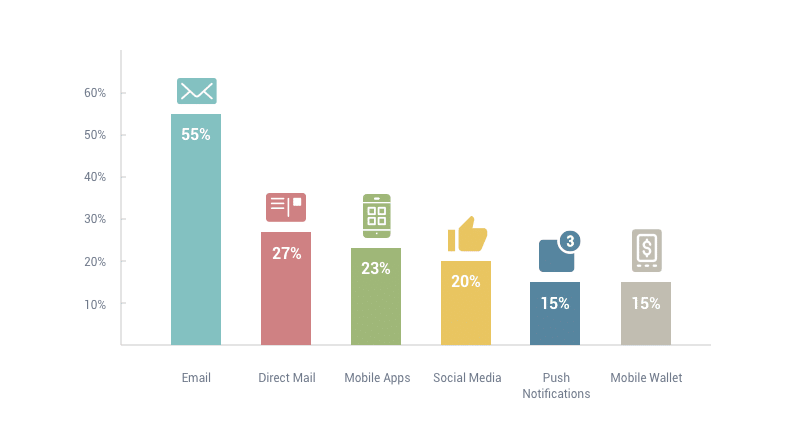
Newsletters. Email marketing. Email campaigns. Automated Emails. No matter what you call it, we get them sent to our email inbox every single day. Some of them are saved and some of them get the automatic delete. Nonetheless, at some point you gave consent for your email address to be used by a company. And, someone out there actually decided to put that email address to good use.
There’s a good chance that you even purchased something after clicking a call-to-action on one of those emails. In fact, 59% of people say marketing emails influence their purchase decisions. Such a high statistic may sound too good to be true but not once you understand how email marketing works. The basis is that you are engaging with people who already like your brand and want to interact with you. Leveraging email marketing for small businesses to achieve goals is crucial in 2020.
Why Email Marketing for Small Businesses Makes Sense
Small business owners can easily end up overwhelmed with a long task list of ways to improve marketing while underwhelmed with results. Marketing can take on many forms which makes it a difficult aspect of business to navigate without experience. Maybe you are the type of small business owner who spends most of their marketing energy planning events, creating specials, and sharing pictures of renovations on social media. You’re probably hoping that these changes will garner the traffic and profit that you’re aiming for. Yet, you’re often left wondering why it doesn’t seem to be enough to grow your business. On the other hand, clients often fall into a second category, those who overspend on advertising with every marketing or PR agency that calls them. These clients get taken advantage of by agencies that are only interested in increasing advertising numbers. So, what is a small business owner do to effectively market?
How to Approach Email Marketing for Small Businesses
When clients approach us for marketing help we immediately ask about their email marketing strategy. Most of the time, clients are slightly confused and refer to either an automated thank you email through their e-commerce platform or reference a list they send a business update letter to every year. Neither of those fully encompasses email marketing by themselves. However, a combined strategic plan for automations, consistency in emails sent, and creative campaigns that promote business while building community is essential email marketing for small businesses. Clients often have an email list of 1,000 or more email addresses when they approach us. So, that’s over 1,000 people who have told them that they like their business and want to be contacted. That’s over 1,000 opportunities to craft a community around your brand. Or, 1,000 conversation starters and conversion starters. That’s over 1,000 more people who are interested versus advertising to the greater public who may not be interested in your company at all. Consider the potential of 1,000 repeat customers.
If you could contact a collection of people that have said they love your business, what would you say to them?
An effective marketing plan capitalizes on generating leads and turning those leads into conversions that matter to the business. Email marketing is your opportunity to romance email leads. They already like you and want to hear from you. Email marketing is your opportunity to make them fall in love over and over again. Additionally, it is a very cost effective method. There are no incremental ad budgets or hidden fees beyond a monthly plan with an email marketing platform like Constant Contact. We love that email marketing is a tool with robust data supporting it right down to specific industry sectors. Therefore, it is easy to hold yourself or your marketing firm accountable on benchmarks and goals. To help you better understand email marketing, we’re sharing some of the our best practices. Here are a few of the most common ways to use email marketing incorrectly with tips on how to handle each situation.
Email marketing is not:
1. An opportunity to share that blog-length story about how you are an expert in some area of your industry.
If the content is longer than a short paragraph then write about it on your actual blog. Use your next email campaign to link to the blog post and drive traffic from the email to your website’s blog. Email campaigns are meant to be more visual and less text heavy. Think of them as opportunities to grab attention not to keep them there. You want to send them to your website to learn more, an event page to buy tickets, or a booking engine to make reservations.
2. A photo gallery to share unrelated photos of your products, services, or location.
We can all get a little excited about beautiful high resolution imagery. However, a compilation of photos of your pets mixed with snapshots from the last conference you attended doesn’t tell the whole story. Are these photos related? Can they be presented in a cohesive way? Each email campaign should have a loose theme or plan around the content that will be included. Use photo and graphic layouts to organize the email and draw email readers in to the important information you want to share.
3. Another social media platform for random posting.
Plan how often you want to send email campaigns. Keep it consistent. Keep it polished. Daily or every other day emails, even short and sweet ones, can do more harm than good. You don’t want to push your email list to the point of unsubscribing. We all get enough spammy emails. When customers sign up for your email list they expect to receive meaningful emails. For example, a client may send a happy holidays email with pictures of festive decorations followed by a thank you for donating email. Then, send a gifting sale email and a merry Christmas email all separately in December. Instead, craft a holiday campaign that can cohesively touch on multiple things. Plan and share in advance to give your audience time to absorb the content.
Knowing which marketing strategies to implement is a complex process based on industry research, knowledge of marketing platforms, and an understanding of business demographics and goals. Luckily, this isn’t a process you have to do alone. A marketing firm in your industry that has taken the time to familiarize with your company history and future plans can make all the difference. If email marketing is not a part of your current marketing plan but you want to begin, start here. Then, contact us for next steps or to discuss questions you may have on incorporating email marketing into your digital marketing strategy.

